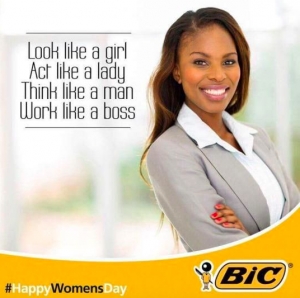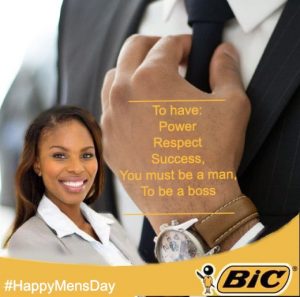Welcome to UBC Blogs. This is your first post. Edit or delete it, then start blogging!
CultureJam
BIC: Why the fight for women’s rights still needs to exist
The main issue that I will be addressing is the popular company Bic’s inconsiderate slogan in South Africa for Women’s Day. The problem is the sexist and derogatory message that was meant to celebrate women. Instead, it addresses how successful men are compared to women. The slogan starts by telling women to look like a girl which suggests that being sexualized is one of the keys to success as a female, according to Bic. Acting like a lady suggests that women should not be irrational and be professional, which further relates to gender stereotypes. Men’s thoughts are not any better than women’s thoughts, individuals can succeed based on their hard work. People are angry and shocked by how outdated this post is which draws on the oppression of women in capitalist societies. Women cannot be blamed for sensing tension and set gender structures in the workplace created by class differentials, society and prominent industries such as Bic. It is as if we have reverted back to the 1980s, although this ad was posted in 2015. This slogan is proof of forced subordination of women by society and a lack of structural inequities which will negatively shape the minds of younger generations that use media as a reliable source. There are multiple dimensions of gender stereotypes because it further includes colour and class in its analysis and judgement. Although this was a South African ad, the message is clear globally. Women are shadowed by the egos and bias of men that hold important. Women will not be able to move higher up the ladder if we have to create our own roles because men will impede our goals.
My alteration revealed that although it was an ad made to celebrate women on behalf of Bic, there is still a sense that the main subject remains as men and their success. Bic should have called it #HappyMensDay. It is likely that men have made this ad for women and have completely missed the mark. The background of a man in a suit represents men overshadowing the success of women and taking credit for their roles in the workplace. The woman figure was made smaller and moved to the side to make room for what men have to say. This is what Bic’s message screamed and how women are truly undervalued in society. I changed the slogan to its direct interpretation. Bic is not the only company that must agree with the slogan because women are not as generally appreciated as men are at companies because of older ideologies that still stand, where women are more useful at home or in communal careers, but most definitely not as leaders. Nevertheless, women have not stood by and accepted this unjust fate. More women are aiming to succeed in traditionally male workplaces and push to the top positions of authority. In the United States, 40% of management positions are occupied by women (Bureau of Labor Statistics, 2017) which signifies great advancement in society. However, most of these jobs are not agency roles where major decisions can be contributed but communal ones, where communication and social skills are the main criteria required, such as secretaries (Hentschel et al., 2019). My alterations should invoke a sense of awareness that although women are blooming in society, the fight for equality is still prominent. Unfortunately, women of colour suffer most from this fight. They must struggle against men and hegemonic feminism to have their voices heard and appreciated. There are many successful and diverse women in all professions, thus gender and colour have nothing to do with intelligence or the ability to lead. If given more opportunities and higher positions along with equal pay, they could prove society wrong and this type of ad would not have been approved. A double-critique perspective of feminism should be reinforced to make a greater impression on the importance of anti-racism, class and feminism as the advanced goal for liberal feminism and women’s emancipation in industries.

Original_ad

Edited_ad
References
Bureau of Labor Statistics (2017). Women in the Labor Force: a Databook. Available at: http://www.bls.gov/opub/reports/womens-databook/2017/home.html
Hentschel, T., Peus, C., & Heilman, M. (2019, January 04). The Multiple Dimensions of Gender Stereotypes: A Current Look at Men’s and Women’s Characterizations of Others and Themselves. Retrieved June 05, 2020, from https://www.frontiersin.org/articles/10.3389/fpsyg.2019.00011/full